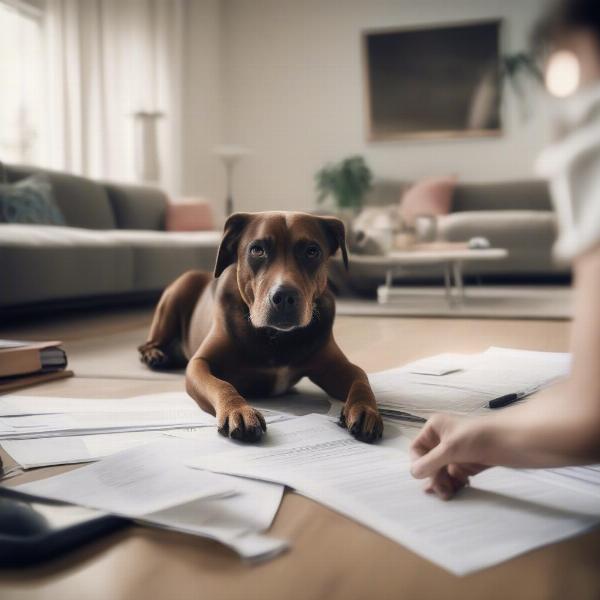Dog bites are a serious matter, and understanding the potential consequences and actions to take if your dog bites someone in your home is crucial. This article provides essential information on how to navigate this difficult situation, covering legal, medical, and emotional aspects.
Understanding the Legal and Financial Implications of a Dog Bite in Your Home
If your dog bites someone in your house, you could face legal and financial repercussions. Homeowner’s or renter’s insurance often covers dog bite incidents, but the extent of coverage can vary. It’s important to review your policy and understand your liabilities. Some breeds are considered “high-risk” and might have exclusions or higher premiums. Additionally, depending on the severity of the bite and local laws, you could face lawsuits for medical expenses, pain and suffering, and lost wages.
 Dog bite and home insurance
Dog bite and home insurance
Immediate Steps to Take After a Dog Bite
After a dog bite, the immediate priority is the victim’s well-being. First, administer first aid. Clean the wound thoroughly with soap and water, apply pressure to stop bleeding, and cover with a clean bandage. Then, seek medical attention promptly, even for seemingly minor bites, to prevent infection and assess potential nerve or tissue damage. Document the incident thoroughly, taking photos of the injury and gathering contact information from witnesses if any were present. Contact your insurance company as soon as possible to report the incident.
Addressing the Underlying Cause of the Bite
Understanding why your dog bit someone is critical for preventing future incidents. Was your dog feeling threatened, protective, or territorial? Was there a history of aggression, or was this an isolated incident triggered by specific circumstances like fear or pain? Consulting with a certified professional dog trainer or a veterinary behaviorist can help identify the underlying causes and develop a behavior modification plan.
Preventing Future Dog Bites in Your Home
Preventing future bites requires a multi-pronged approach. Ensure your dog is properly socialized from a young age, exposing them to various people, environments, and situations. Obedience training is crucial for establishing clear boundaries and control. Provide your dog with a safe and enriching environment, including designated spaces for them to retreat when feeling overwhelmed. If your dog has a history of aggression, consider muzzle training for situations where they might be stressed or uncomfortable. Clear communication with guests about how to interact with your dog can also help prevent misunderstandings and potential bites. Warn them not to approach your dog while they’re sleeping or eating, and to avoid sudden movements or loud noises.
Conclusion
A dog bite in your home is a serious event with potential legal, financial, and emotional consequences. Taking immediate action for the victim’s well-being, understanding your legal responsibilities, and addressing the underlying causes of the bite are crucial steps. By focusing on prevention through training, socialization, and environmental management, you can create a safer environment for both your dog and those around them. Remember that addressing the root cause of the behavior is essential for long-term success in preventing future incidents.
FAQ
- What should I do if my dog bites a child in my house? Immediately seek medical attention for the child, even if the bite seems minor. Follow the same steps outlined above for documenting the incident and contacting your insurance company.
- Will my dog be put down if they bite someone? The outcome depends on the severity of the bite, local laws, and the dog’s history. In some cases, mandatory quarantine or behavioral assessments may be required.
- Can I be held liable even if the person provoked my dog? Liability can be complex and depends on the specific circumstances. Having homeowner’s or renter’s insurance and consulting with a legal professional is essential.
- How can I find a qualified dog trainer or behaviorist? Your veterinarian can often provide referrals to certified professionals in your area.
- What if my dog bites someone who is trespassing on my property? While laws vary, property owners generally have a duty to prevent harm, even to trespassers. Consult with a legal professional.
- Does having a “Beware of Dog” sign protect me from liability? A warning sign can make visitors aware of a dog’s presence but does not necessarily absolve you of all responsibility.
- What are some signs of aggression in dogs I should be aware of? Signs can include growling, snarling, snapping, lunging, raised hackles, and stiff body posture.
Related Articles:
About ILM Dog:
ILM Dog is your trusted international resource for expert advice on dog care and wellbeing. We offer comprehensive information on a wide range of topics, including dog breeds, health, training, nutrition, grooming, and accessories. Whether you’re a new dog owner or a seasoned expert, ILM Dog provides practical, reliable information to help you provide the best possible care for your canine companion. For inquiries or professional advice, contact us at [email protected] or +44 20-3965-8624.